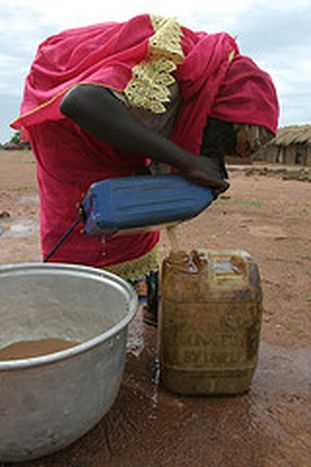
EU-Africa partnership: lack of trust and equality
Published on
By Desiree Ketabchi 50 years after the end of colonisation, it is time to make a point about the relations between the European Union and Africa. Even if big progresses have been made, important challenges need to be faced. Often called “continent of the future”, Africa certainly has a lot of potentialities, and big expectations lie on it.
The main obstacle to its growth is the weak infrastructure, as the panellists of the International Policy Summit “Partnership Africa: New Horizons for EU- and inter-African Cooperation”, held last Monday and organised by the think-tank Friends of Europe, said.
Photo: © hdptcar / Flickr
The importance of improving infrastructure to increase trade and support for the continent’s growth was repeated over and over throughout the meeting. According to David Batt, Director of OECD’s Africa Partnership Forum Support Unit, the development of infrastructures is necessary not only to enhance trade but also to achieve the health-related standards fixed by the Millennium Development Goals. Without transports, routes, electricity and other facilities, fighting child and maternal mortality is a lost battle.
The question is, how should Africa support its necessary economic growth? Integration among the African countries and the development of regional trade is the key to success according to Michael Gahler, German MEP, who reminded the audience that it is what allowed Europe to reach its actual level of prosperity, achieved by increasing inter-states trade and signing cooperation treaties. Maxwell Mkwezalamba’s, African Union Commissioner for Economic Affairs, also strongly believes that Africa can reach prosperity through integration. Although challenges remain, such as monetary integration, which has been too slow until now, as well as movement of people and investment flow.
Renewable energies also played a big part in the debate last Monday. Producing renewable energy is expensive and needs technical research; therefore it is more the responsibility of the foreign companies exploiting resources in Africa to implement it. The main challenge right now is gaining efficiency and a better distribution of energy to the local population. The problem is that most of the times, the companies buying territories in Africa to produce biofuel, bring it to Europe to sell it, so it is not beneficial for Africa. Franziska Keller, MEP member of the Greens, points out that the money is generally used to export biofuel, instead of being used locally.
Mark Plant, the Deputy Director if the Africa Department at the International Monetary Fund underlined the importance of peace and security, as necessary conditions for growth. International organisations should encourage conflict resolution, to create the right framework for trade and development to take place. Shalil Shetty, Secretary General of Amnesty International, also thinks that the “human side” should play a bigger role in this partnership. « Peace, development and human rights should be the pillars of every negotiation. There is no connection though between development and human rights », he said. « There is also a trust deficit, a lot of promises are made and not kept by western countries».
This lack of trust and equality between the two partners has been emphasized many times in addition to the several speakers at the conference. Is “partnership” the right word if the two actors are not at the same level? Power is not equally distributed, and Europe is partly financing Africa’s growth, but « asymmetrical relationships can only become partnerships if the interests, benefits and costs are clear to both partners », says Siegfried Schieder, author of “Trade and development in EU-Africa relations”.



